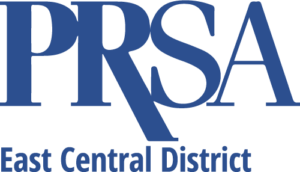PRSA ECD Releases Mental Health Survey Results
By: Kaylin R. Staten, APR
This year, mental health remains an advocacy priority for PRSA ECD. According to the National Institute of Mental Health, one in five Americans has a consistent mental illness. This includes multiple mental health conditions in various stages.
As more mental health issues are experienced both personally and professionally, it continues to be vital to have authentic conversations in all aspects of life and work. These conversations allow awareness to morph into much-needed action.
In April, PRSA ECD conducted an online survey with our membership and released the results at our May 2024 board meeting. While this survey did not glean the representative sample we aimed for, it allowed us to gain valuable insights into the lives and work of our PRSA Chapter leaders and members. Members and leaders in 12 Chapters participated. (Note: PRSA ECD has 15 Chapters as of January 2024. Akron also is included in this since someone identified as an Akron Chapter member. Akron is now part of Greater Cleveland.)
While this survey had 147 respondents, only 31 were usable due to the fact that A.I., specifically bots, crawled the survey and responded, skewing the results. While this was disappointing, we remain uplifted by the knowledge we gained in this pilot survey. These results are one of the first steps to greater knowledge and understanding.
Our key insights include the following:
- 54.8% of respondents were members vs. Chapter or District leaders.
- 48.4% of respondents mostly prioritize their mental health.
- The majority works 40-50 hours per week in their PR roles and 10-20 hours with PRSA-related activities (membership or leadership).
- 51.9% feel stress in their PR positions, with 9.7% feeling neutral and 38.7% not feeling as stressed in their PR roles.
- Related to PRSA roles, 38.8% feel stressed, 9.7% feel neutral, and 51.4% feel less stressed.
- Burnout is a real issue within the PR industry, with hustle culture and mass self-communication having some degree of correlation. Hustle culture appears to have a slight-to-significant effect, with more than half of respondents (64.5%) attributing at least some contribution of hustle culture to their overall stress levels.
- The effects of burnout are felt by PRSA ECD members and leaders, with 80.6% feeling more the stage of frustration than exhibiting the other three stages of lack of enthusiasm, stagnation, and apathy.
- The top three sources of burnout are workload (51.6%), personal stress (41.9%), and feeling uninspired, unmotivated or unproductive (41.9%).
- The majority of respondents do not feel strongly that they need to compartmentalize their emotions or feelings in their PR and PRSA roles (45.2%).
- However, respondents felt as though their sense of self is sometimes (38.7%) or frequently (32.3%) impacted by their PR roles.
Here is some qualitative data from our open-ended question (some edits for clarity):
- “This survey is a great start. Let’s move from awareness to action.”
- “I think PRSA should just build in mental health as an awareness point for programming and resources – much like we do with DEI. I don’t think it needs to have separate bolted-on programs.”
- Burnout is a real challenge, and I’m especially seeing it in mid-career professionals. There’s also somewhat of a contentedness crisis and questioning occurring right now whether folks mid-career want to continue on with the level of on-demand work and crisis comms that director-CCO roles require. What is the cost? Perhaps some executive coaching, seminars, or other professional development/mentorship could be helpful.”
- “I think PRSA, over time, just becomes a lot. I’ve seen it many times, people who have climbed through Chapter leadership, become the president, and then disappeared after fulfilling their immediate past presidency. In fact, I’d say most past presidents in our chapter are barely involved at all after being president. I think that is a statement about the time commitment and workload. PRSA is great. It does provide a lot of value and benefits, but at times, it’s like another job. Particularly in any leadership role.”
The above insights are just some of the highlights from our survey results. The link to our preliminary report, via Google Forms, is located here. The slide deck with selected data is located here. As the year progresses, we will continue to analyze additional correlations in these results.
Next Steps
While over half of respondents thought that PRSA ECD and PRSA National provide adequate resources, we still have room to grow. Some next steps/action items for the ECD:
- A mental health toolkit, since approximately 58 percent of respondents expressed interest in a toolkit. We will include resources, evidence-based practices, research, narratives, and tips to help our membership and PRSA at large and host the toolkit on our website, prsaecd.org, with changes added as needed. Stay tuned for the toolkit in the coming months! We aim to release it in August-September 2024.
- More research, such as focus groups, will potentially be conducted in Fall 2024, so we can address key mental health elements outlined in our survey, in addition to anything new we would like to know as a District.
- A one-page fact sheet that can be printed or emailed showing key insights and showcasing our toolkit.
- Prioritization in our executive committee and board meetings, Chair Coffee Chats, Leadership Roundtables, 2024 QuickStart Leadership Conference, and more programming. Conversations and actions will continue – both at the ECD and PRSA National levels.
This is only the beginning. We look forward to working more with our Chapters and PRSA National on mental health and more. Thank you to everyone who participated in the survey and for helping us to spread the word about it! Stay tuned for more research opportunities this year.
If you have any questions or further insights, please reach out to Immediate Past Chair and Advocacy Chair Kaylin Staten, APR, at kaylin[at]hourglassmedia[dot]company or prsaecdsocial[at]gmail[dot]com.


